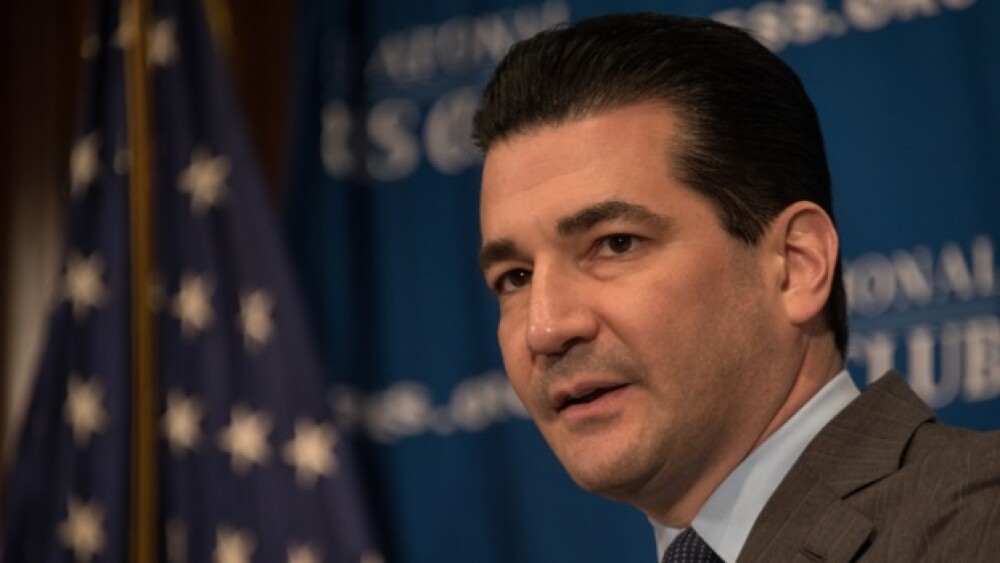On Sunday, U.S. Food and Drug Administration Commissioner Stephen Hahn told the Financial Times that he would potentially fast-track a COVID-19 vaccine before clinical trials are done if it was “appropriate.”
Albert H Teich/Shutterstock
On Sunday, U.S. Food and Drug Administration (FDA) Commissioner Stephen Hahn told the Financial Times that he would potentially fast-track a COVID-19 vaccine before clinical trials are done if it was “appropriate.” He claimed politics were not part of that decision, saying “this is going to be a science, medicine, data decision.”
Former FDA Commissioner Scott Gottlieb CBS’s “Face the Nation” criticized the statement on CBS’s “Face the Nation,” noting, “I don’t know what is meant by saying before the Phase III trials are completed. These Phase III trials are event-based trials, meaning that they’re going to start to read out data after a certain amount of events accrue in the clinical trials. And those events are people getting COVID infection. And so as the trials progress, if we start to see lower rates of COVID infection in the active group, the group that receives the vaccine versus the placebo group, the group that hasn’t received the vaccine.”
There are currently more than 165 vaccines in developing around the world against COVID-19. Eight are in Phase III trials: Moderna; BioNTech, Pfizer and Fosun Pharma; AstraZeneca and the University of Oxford; CanSinoBIO; The Wuhan Institute of Biological Products; Sinopharm; Sinovac; and Murdoch Children’s Research Institute, which is testing the BCG vaccine, which has been in use globally since the early 1900s for tuberculosis.
Many public health, vaccine and immunology experts are concerned that the Trump administration is politicizing the vaccines and wants a so-called “October surprise,” by being able to announce a vaccine is available just prior to the November election. President Trump was recently rumored to have told staffers he wanted to give the AstraZeneca-University of Oxford’s COVID-19 vaccine emergency use authorization (EUA) ahead of the November 3 election.
The industry is also closely watching statements from Hahn and other Trump administration officials. Hahn recently came under fire for dramatically overstating clinical trial data related to the clinical data related to convalescent plasma treatments for COVID-19. Both Hahn and Health and Human Services Secretary Alex Azar have walked back statements, with Hahn issuing an apology.
During the press conference, Azar claimed the use of convalescent plasma offered patients a 35% survival benefit in patients “who benefited the most.” This was grossly incorrect, with the actual figure suggesting that at best it would benefit 5% and more accurately only 3%.
Regarding the possible fast-track status, Hahn told the Financial Times, “It is up to the sponsor [vaccine developer] to apply for authorization or approval, and we make an adjudication of their application. If they do that before the end of Phase III, we may find that appropriate. We may find that inappropriate, we will make a determination.”
He noted that granting a vaccine approval before the completion of the trials could be done in a safe and effective way with an EUA being granted for certain groups of people. He said, “Our emergency use authorization is not the same as a full approval. The legal, medical and scientific standard for that is that the benefit outweighs the risk in a public health emergency.”
In this regard, Hahn and Gottlieb seem to be talking about slightly different things. Gottlieb stated, “I think, again, of full approval for the general population, where people can go to CVS and get a shot, that’s really a 2021 event, maybe the first quarter of 2021, probably more likely the first half.”
Anthony Fauci, director of the U.S. National Institute of Allergy and Infectious Disease (NIAID), who is a central figure in the White House coronavirus task force and the leading expert on vaccines and pandemics in the world, said earlier this month that distributing EUA for a vaccine came with potential problems.
“The one thing that you would not want to see with a vaccine is getting an EUA before you have a signal of efficacy,” Fauci said. “One of the potential dangers if you prematurely let a vaccine out is that it would make it difficult, if not impossible, for the other vaccines to enroll people in their trial.”
In addition, polls have suggested that anywhere from a third to a half of the U.S. population says they won’t get a vaccine, at least at first, because they don’t trust it and are concerned it is being rushed. Many public health experts have expressed worry that any problems with a vaccine or the overall sense that it is being approved before it’s proven safe and effective will only further erode that trust.





